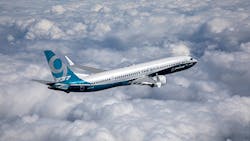Boeing Co. (IW 500/9) is temporarily suspending flights of its new 737 Max jetliner because of a potential manufacturing flaw in the engines, marring the commercial debut for the fastest-selling plane in company history.
The jetmaker and its engine supplier, a venture of General Electric Co. and Safran SA, are rushing to understand the problem ahead of the aircraft’s first delivery, which remains scheduled for later this month. Boeing said a possible quality defect in the Leap engine’s low-pressure turbine discs was discovered during inspections and hadn’t affected flight testing of the upgraded 737.
The grounding added to concerns about the strain on suppliers as the U.S. manufacturer and European rival Airbus SE unveil new aircraft models while ramping up single-aisle production to record levels. Boeing is counting on a smooth start for the 737 Max, the newest version of a plane that is the company’s largest source of profit, as it seeks to boost cash flow.
“Investors are acutely focused on 737 Max ramp risk -- and the impact on cash,” Robert Stallard, an analyst at Vertical Research Partners, said in a note to clients.
Boeing fell 1.2% to $183.18 at the Wednesday close in New York, the second-biggest decline on the Dow Jones Industrial Average, after adjusting for the beginning of trading without the right to a dividend. GE dropped 0.8% to $28.70.
Racing to Catch Up with Airbus
The Max has accumulated 3,714 orders before its commercial debut but is still racing to catch up to Airbus’s A320neo. The latest 737 model is slated to be handed over this month to Malindo Air and Norwegian Air Shuttle ASA. Other major customers with deliveries this year include Southwest Airlines Co. and American Airlines Group Inc.
The decision to halt flights was made “out of an abundance of caution,” said Boeing spokesman Doug Alder, adding that the plane completed flight testing months ahead of schedule. “The step is consistent with our priority focus on safety.”
Malindo, an affiliate of Indonesian carrier PT Lion Mentari Airlines, didn’t respond to an email seeking comment. It had expected to take the 737 Max early next week, advertising that commercial service would begin May 19. In 2012, Lion announced the signing of a $22.4 billion order with Boeing. Other Asian customers for the Max include SpiceJet Ltd. in India, Singapore-based lessor BOC Aviation Ltd., VietJet Aviation Joint Stock Co. in Vietnam and the continent’s biggest carrier China Southern Airlines Co.
Rick Kennedy, a spokesman for GE Aviation, said about 30 CFM International engines will be inspected at sites in the U.S. and France. In the meantime, production will continue using discs from other CFM suppliers, he said. The issue doesn’t affect other versions of the Leap engine used on planes from Airbus and Commercial Aircraft Corp. of China Ltd., Kennedy said.
“This doesn’t look like a serious concern,” Cai von Rumohr, an analyst with Cowen & Co., said in a note to clients. The engine problem is “not a design shortfall but what appears to be an easily fixable sub-tier supplier component issue.”
Both CFM and rival Pratt & Whitney, which together make the bulk of engines for narrow-body commercial jets, have encountered faults as they’ve churned out turbines over the past year.
Pratt Delays
Airbus has fallen behind in deliveries of its A320neo family of aircraft as Pratt’s cutting-edge geared turbofan engine encounters durability issues and production snarls. Executives of Air Lease Corp., a Los Angeles-based aircraft lessor, warned during an earnings call last week that a CFM-powered model was also encountering delays.
CFM faces a steep production increase for the Leap, as Boeing and Airbus plot to increase narrow-body production by 33% through the decade’s end. After delivering 77 of the engines last year, 28 fewer than it had predicted, CFM has targeted producing about 500 Leap this year and about 2,000 in 2020.
“It’s important that this gets straightened out pronto,” Nicholas Heymann, an analyst at William Blair & Co., said of the engine issue. Bladed discs, located in the hot section of a turbofan engine, pull energy from the hot gases of the combustor to produce thrust. The components must be able to withstand extreme stresses and high temperatures inside the engine.
The Leap 1-B engines, created for Boeing’s Max, were repeatedly inspected during more than 2,000 hours in the air for the Max 8’s flight test program, which concluded during the first quarter, Alder said. The engine endured another 3,000 simulated flight cycles during testing that ended last month so the plane would be certified for long ocean flights.
Airline Impact Unclear
The impact on airline customers eager to show off the brand-new planes wasn’t immediately apparent. Boeing has several unaffected engines available that it could swap to avoid lengthy delays on initial deliveries, Alder said.
For Norwegian, also awaiting its first Max this month, the inspections “will result in a few days’ delay” but aren’t expected to disrupt the carrier’s new trans-Atlantic flights starting next month, spokesman Anders Lindstrom said in an email. The carrier had expected to take five more of the single-aisle planes in June.
Southwest and American said they hadn’t been notified of any changes to their Max delivery schedules. Southwest is the second-biggest customer for the Max after Lion Air, with 200 on order, while American has ordered 100 of the planes.
On-time delivery of Southwest’s Max planes is critical because the Dallas-based airline is counting on them to fill a gap when it retires its oldest aircraft on Oct. 1. Southwest is set to take delivery of its first Max in July, the airline’s chief financial officer said in January. American is scheduled to receive four Max aircraft this year, the first in the third quarter.
By Julie Johnsson and Richard Clough
About the Author
Bloomberg
Licensed content from Bloomberg, copyright 2016.
